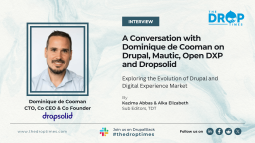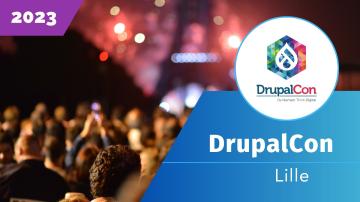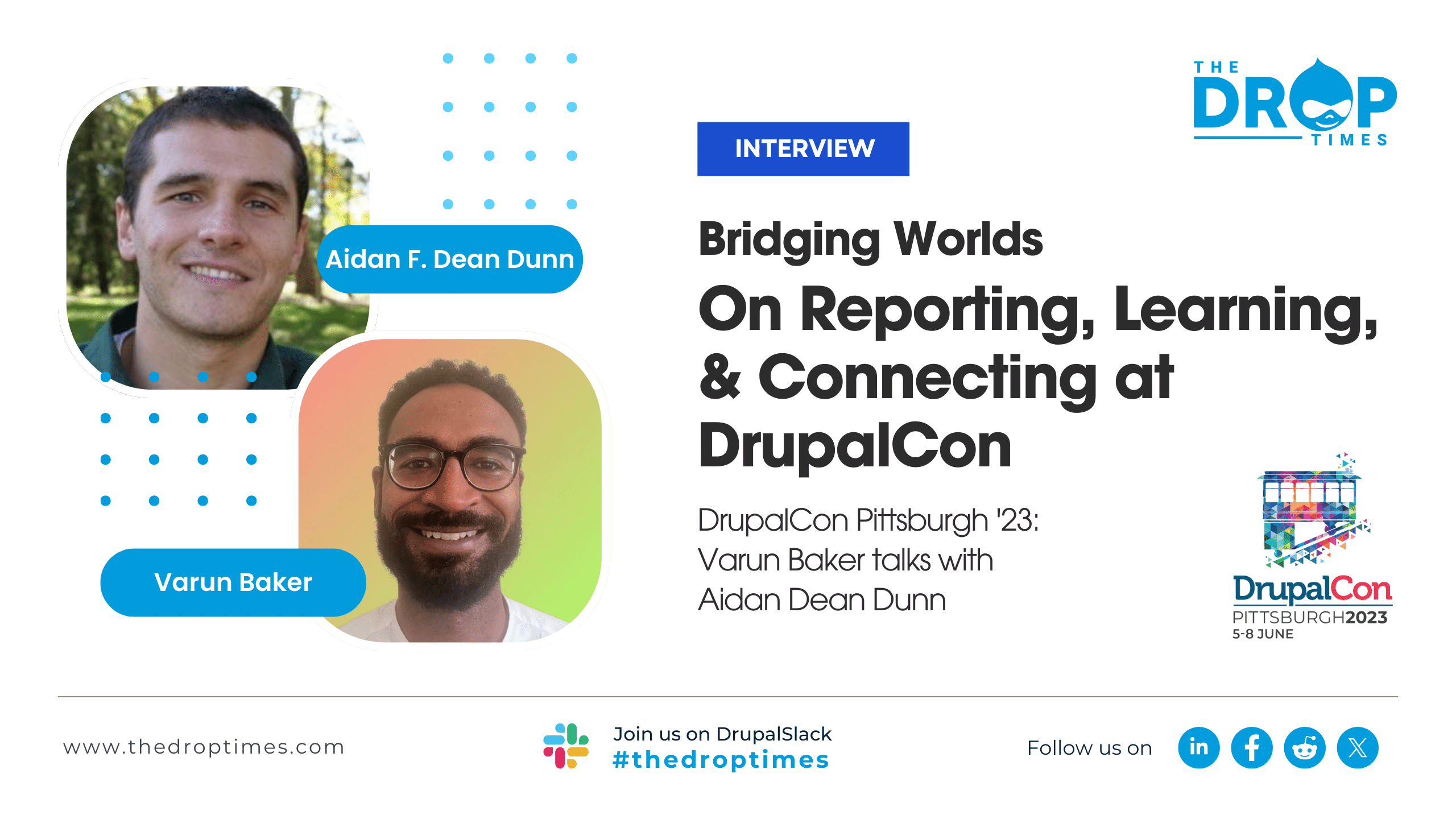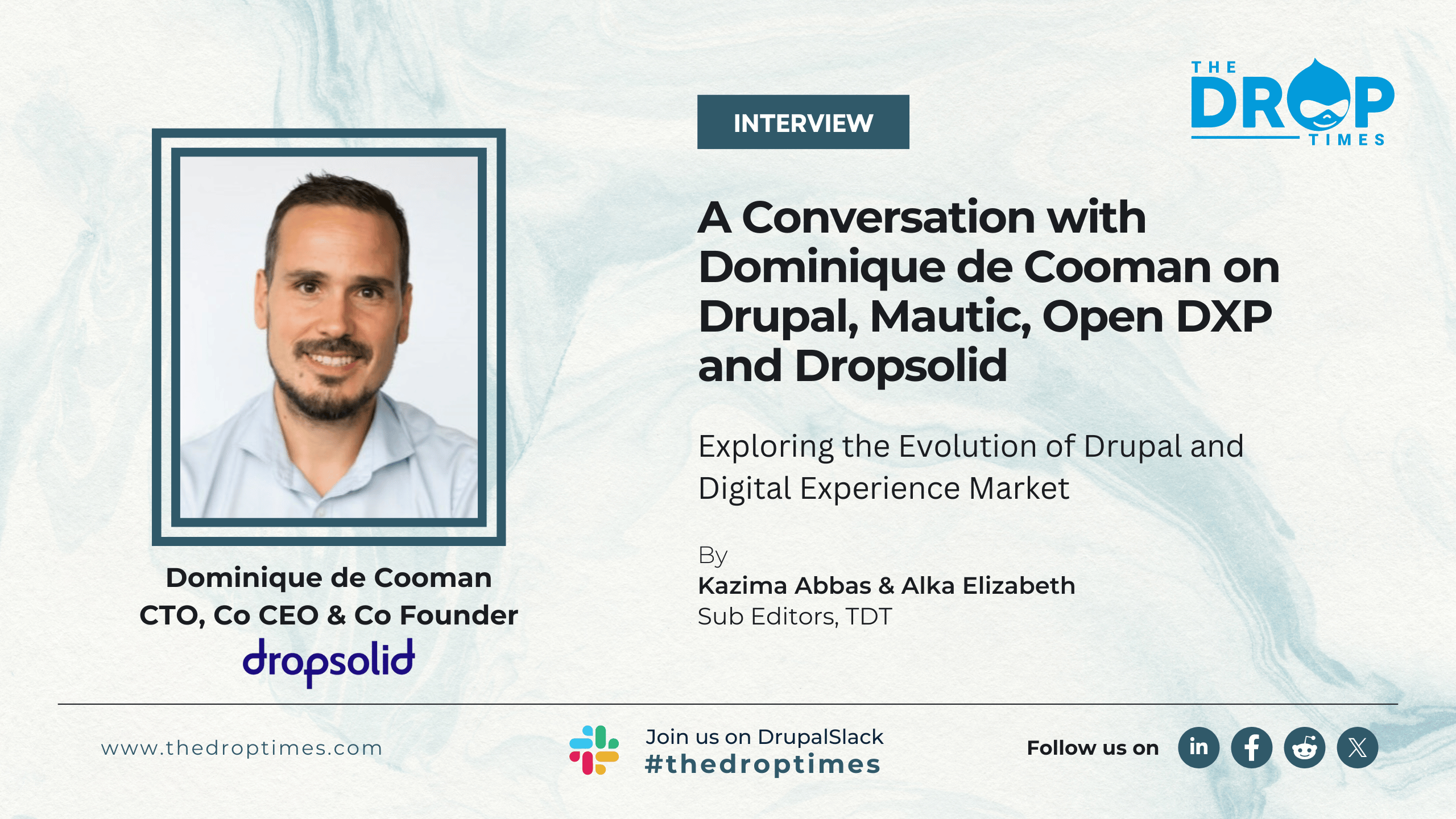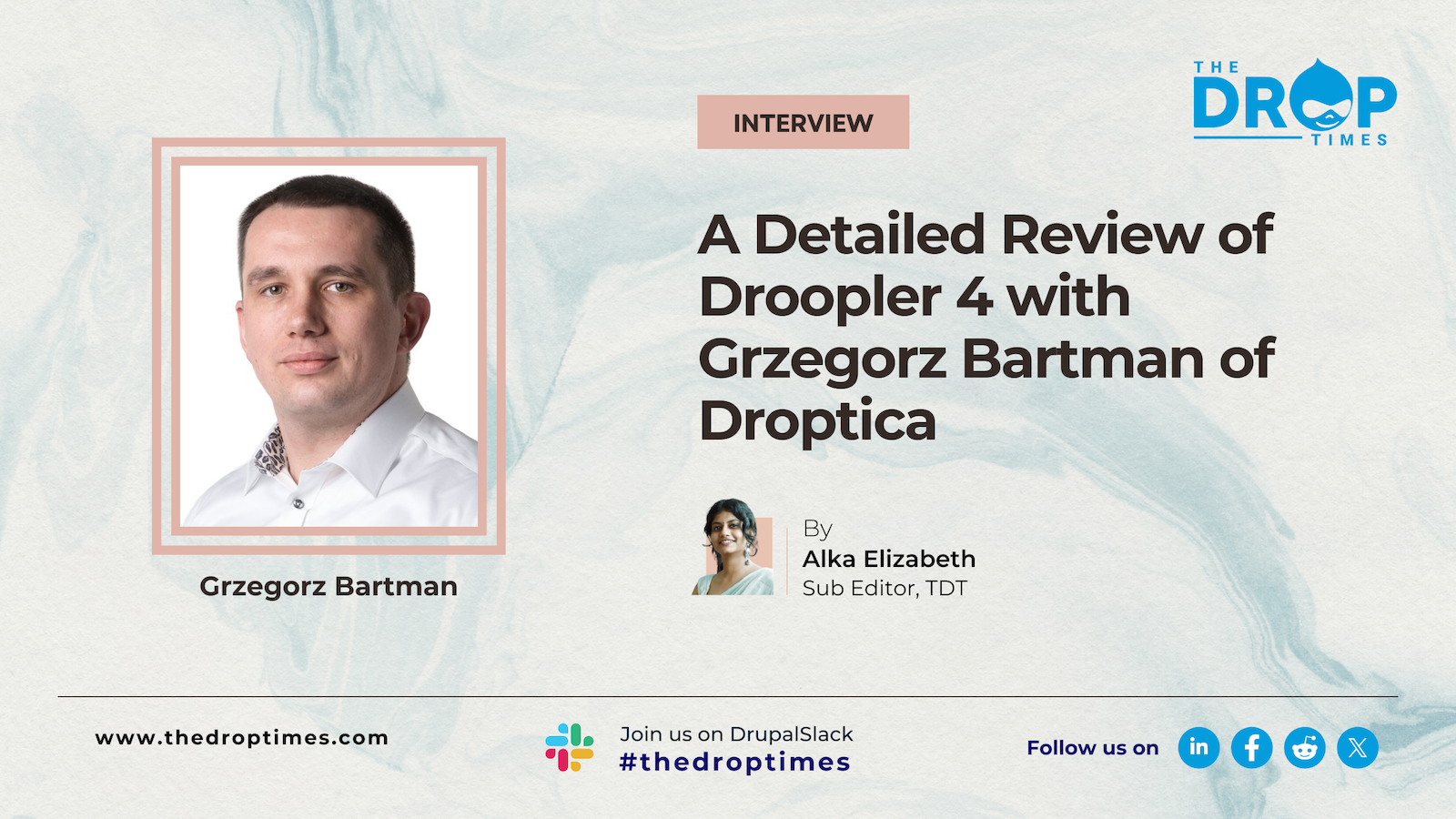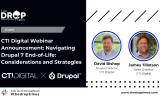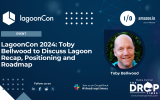Think Licensing to Ensure Responsible Use of AI Tools, Says Lyubomir Filipov
A veteran with more than 15 years of experience in the technical arena now holds the mantle of being a Group Architect and Deputy Program Manager at FFW. Lyubomir Filipov is a man who leads by action, and he is someone who ensures that the right talent meets the opportunity, leading to crafting career paths for more than 800 professionals at FFW.
In an email correspondence with Alka Elizabeth, sub-editor at The DropTimes, Lyubomir shares pivotal moments in his professional career, starting from his inaugural interaction with Drupal.
Lyubomir does not recall his first interaction with Drupal in 2016 to be all smooth. Still, the latter did charm him along the way, developing a good partnership and realizing how effective Drupal is in solving problems. Quite recently, Lyubomir made a presentation at DrupalCon Lille, focussing on executing large-scale multilingual digital transformation programs using Drupal. His experience in large-scale multilingual digital projects reveals the challenges of global nuances and Drupal's vital role in overcoming them.
"Language nuances may vary across countries—Canadian French differs from Belgian French and the French spoken in France. Most of the time, when using design systems, they are not developed considering that they could be used globally."
says Lyubomir.
Beyond his professional role, Lyubomir actively engages in community events, fostering growth and mentorship. He details community involvement from two perspectives: professional and organizational point of view, and despite the hardships, he takes pleasure in knowing,
"There is nothing better than organizing an event, seeing a young talent joining the industry, and then witnessing the same person become a professional working for a major company five years later."
Looking ahead to 2024, he envisions focusing on effectiveness and smart work. He sees artificial intelligence as not a threat but an opportunity, urging responsible usage. Active in Bulgaria's PHP User Group, he emphasizes the collaborative learning culture in meetups, encouraging questions and contributions. He is also a member of PCVT - the Programmers Club in Veliko, Tarnovo, where he holds a position on the organizing team for the 'Digital Summit,' the largest conference in North Bulgaria.
In this candid interview, Lyubomir Filipov's experiences and insights paint a vivid picture of a tech professional deeply connected to his community, navigating challenges and embracing the changes in web development and architecture. If this might be of interest to you, please read on.
It Wasn't Love at First Sight
TDT [1]: You have been in the field of PHP since 2011; when did the tracks intersect with Drupal?
Lyubomir Filipov: The journey from 2011 until 2016 was quite interesting. I worked on various projects using different frameworks and obtained the Certified Zend Engineer certification (some people might not be familiar with the certificate now). In 2016, I had the opportunity to work on a Drupal project for the first time. It was a learning system, and we used Opigno for it. I won't lie; it wasn't love at first sight, but over the years, we developed a good partnership, and now I know how effective it is to use Drupal to solve problems.
TDT [2]: Can you highlight some key milestones and experiences that have shaped your role as a Group Architect at FFW?
Lyubomir Filipov:
- Successfully conducted 50+ interviews, ensuring the right talent meets the right opportunity.
- Career Path Architect: I am proud to have devised career trajectories for companies that now guide over 800 professionals toward their ambitions.
- Mentorship & Growth: Instrumental in the technical and career advancement of over 50 professionals. Proudly shouldering the technical responsibility for our company's most prestigious client in Europe.
Lead as an Example
TDT [3]: As someone responsible for all developers at FFW Agency's Veliko Tarnovo office, what strategies do you employ for effective team management, especially when working on large-scale Drupal projects?
I am responsible for the technical growth of people in the Gabrovo and Veliko Tarnovo offices. Additionally, I hold another position as Deputy Program Manager. I have applied the rule "Lead as an example, be transparent, and make sure that people are aware of the current situation, what the plan is, and why we are executing the plan." Also last, but not least, people are aware that their opinion is valuable and will be taken into account.

Challenges with Multilingual Digital Transformation
TDT [4]: Your presentation at DrupalCon Lille focused on executing large-scale multilingual digital transformation programs. Can you elaborate on the challenges faced and the solutions provided, especially in the context of deploying over 50 different decoupled sites?
Lyubomir Filipov: When deploying a platform in 50 countries, people may need to be made aware of the challenges. Language nuances may vary across countries—Canadian French differs from Belgian French and the French spoken in France. Most of the time, when using design systems, they are not developed with the consideration that they could be used globally. This primarily results in issues concerning date formats and visual appearance. Designers often use only English for mockups, but differences in languages like German, Japanese, and Chinese may significantly modify design rules, impacting translations. While reusing translations is a good idea, someone should always be responsible for them, considering both local (country-specific) and global (platform-wide) perspectives. Last but not least, invest time in creating materials and providing guidance for editors on how to locate specific translations.
TDT [5]: Why did you choose Drupal for your large-scale multilingual digital transformation programs? What specific role does Drupal play in addressing the challenges you mentioned?
Lyubomir Filipov: I work at FFW, one of the largest Drupal agencies in the world. Drupal has consistently been our primary tool for providing life-changing experiences for our clients. Using Drupal for translations has helped us a lot; we have mapped strings from various microservices and successfully imported them for accessibility through the Translation Interface.
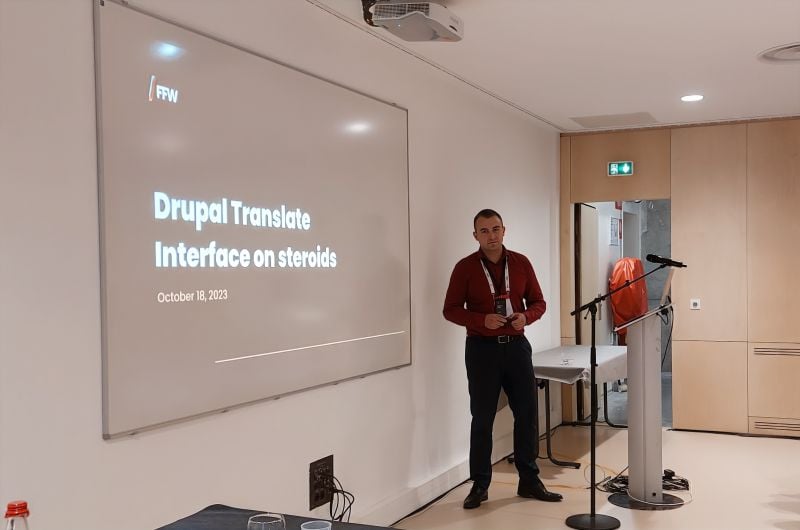
Pain Points in L10n
TDT [6]: In your experience, what are the common pain points in translations for large-scale projects, and how have you addressed them?
Lyubomir Filipov: Avoid duplicates—ensure you have scanned the translations in advance. Consider context—for instance, if you see a component with the button labeled "Go" and another component with the same English translation for the button, don't think it will remain unchanged. I can assure you that, from a business perspective, providing context allows for different translations, which is beneficial. Dedicating time to tutoring clients and video recording can be extremely helpful and appreciated by the business. Clients will be happy if they feel and understand that you are always there for them and doing everything you can.
Perks of Being an Organizer
TDT [7]: You are actively involved in various community groups and events like that of Drupal. How do these activities contribute to your professional growth, and what inspired your involvement in organizing events like Code4VTU, weekly meetups, and seminars?
Lyubomir Filipov: I have been an active member for the last 15 years, participating in different events, and at some point, I started organizing them. From a professional point of view, attending such events is beneficial as it allows you to acquire new knowledge and communicate with interesting people. From an organizational point of view, yes, it can be exhausting, but the energy from the people attending the events makes it worthwhile. Nothing is better than organizing an event, seeing a young talent joining the industry, and then witnessing the same person become a professional working for a major company five years later. The satisfaction of knowing that you helped that person to start their journey is unmeasurable.
Accidental Academic
TDT [8]: You're currently working on your Ph.D. in Biometrical Data security. What motivated you to pursue research in this area, and how does it intersect with your work in web development and architecture?
Lyubomir Filipov: Honestly, it all started at a conference where I talked about "Fuzzy matching of strings." I was involved in a project requiring the manual indexing of strings—typed by different people, enabling subsequent searches. The approach and research resonated with many attendees, and after one of the talks, a professor from KU Leuven approached me, asking, "Would you like to work on a similar problem?" That's how it started. They were seeking someone with a business background and out-of-the-box thinking to work on a specific solution. It's all about solving problems; people in our industry love solving them.
Be Eager to Learn
TDT [9]: At Digital4Tarnovo, you presented on the road to travel for Digital Experts in 2023. How does the road look down to 2024? What might be the major change?
Lyubomir Filipov: I would say effectiveness—measuring how much work one person could deliver in terms of speed and quality. We live in a time where if you want information, you can easily find it; you don't have to wait for months for a book or visit the local library—everything is one or two clicks away. As a university tutor, I've observed that over the past few years, people seem to be becoming less motivated, with students appearing less "hungry" for knowledge. Therefore, it is crucial to rely on a solid foundation, continually strive for improvement, leverage AI to enhance efficiency, adopt the principle of "working smart, not hard," and be eager to learn. This, I believe, is the path forward for 2024.
Evolution of AI
TDT [10]: How do you see the role of Artificial Intelligence evolving, and what implications does it have for professionals in the digital field?
Lyubomir Filipov: I don't see artificial intelligence as an implication; I see it as an opportunity. There are exciting ways to look into it. I recommend reading "LIFE 3.0: Being Human in the Age of Artificial Intelligence"1 for those interested in understanding potential future outcomes. It is up to us how we will use this power; it might sound cliché, but as Spiderman says—"With great power comes great responsibility." I am sure that each one of us could think of at least three problems that could be solved by involving artificial intelligence.
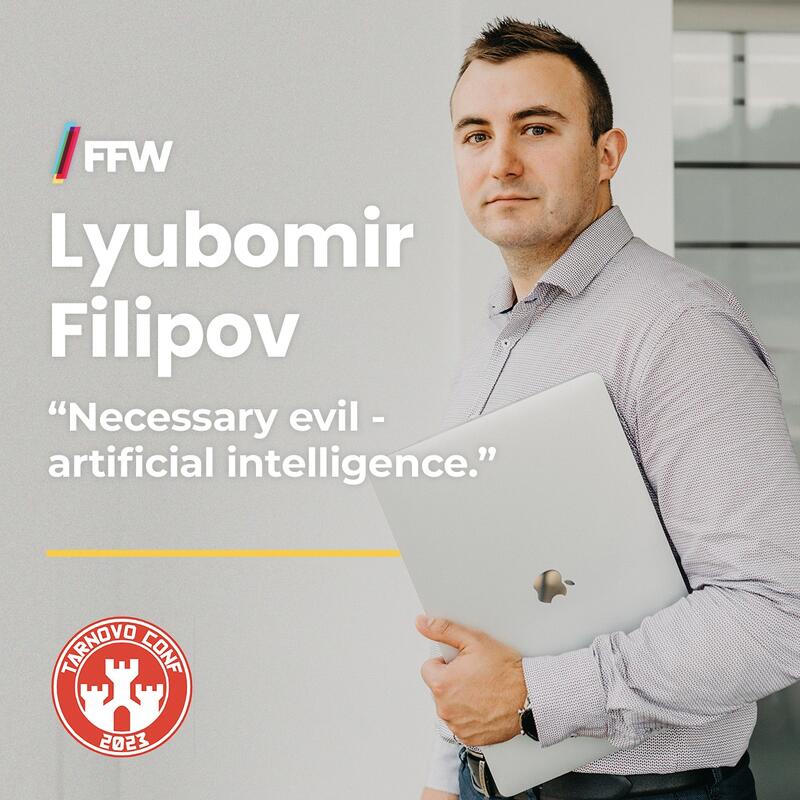
The Importance of Meetups
TDT [11]: Being involved in the Bulgaria PHP User Group and Programmers Club Veliko Tarnovo, how do these communities influence your work and professional network?
Lyubomir Filipov: I have been attending meetups for more than ten years, and being part of a group is really helpful for personal growth. In these meetups, you often have the chance to engage in discussions with people who have more experience than you or are already experts in a certain area. You can freely pose questions and then brainstorm with the group. The exchange of opinions and experiences is also vital. Large groups have more answers than questions. If you are beginning your career, don't hesitate to ask questions and participate in such events. If you have already gained experience, please contribute in return.
Saying 'No' Is Also a Viable Option
TDT [12]: What specific challenges did you face when executing large-scale multilingual digital transformation programs using Drupal?
Lyubomir Filipov: I could organize them into two categories: technical debt and interpersonal relationships. Before initiating any transformation, the most significant challenge lies in the planning process. If you plan meticulously, nothing will catch you by surprise, and everything will unfold according to the established plan. Ensure that you invest sufficient time in comprehending the business, understanding the challenges faced by individuals currently utilizing the old platform, and carefully evaluating all requests for optimization. Consult with stakeholders and align expectations. Be realistic; saying 'No' is also a viable option. As professionals, we should not mislead our clients solely to appease them.
Once the planning phase is complete, gather your team and present the plan to them. Accept feedback, remain flexible, make adjustments on the go, and consistently ensure everyone comprehends their assignments. Inform the stakeholders so that they are cognizant of the implications of their decisions—whether it involves creating technical debt, introducing new features, or understanding every aspect of the problem. Allocate a percentage of the work time to address technical debt, perform updates, and conduct security audits.
Always inquire about future plans when working on a new feature, ensuring that the multilingual aspect is consistently considered during the design and implementation phases. When contemplating the feature, think from a user experience perspective—evaluate whether it makes their life easier or more challenging. Ensure all content is translated from a centralized location, such as the Drupal Translation Interface, and establish a clear distinction between Translation and Settings.
For interpersonal relationships, organize knowledge transfer sessions for technical and business personnel and anyone involved in the process. Record all sessions and meticulously plan the content and presentation approach. Guarantee accessibility to all files. In the context of large-scale programs, incorporate 'How-to' videos directly into the platform, preferably adjacent to each component. Utilize a private YouTube channel or other suitable platform to store these instructional videos.
Responsible AI
TDT [13]: How do you envision artificial intelligence being used responsibly in the future?
Lyubomir Filipov: As far as I know, there will be regulations in the EU similar to those we have for GDPR, and there is an expectation to designate a responsible person within an organization to ensure compliance with all the rules. Personally, I am opposed to restricting access, as it harks back to a time when only select individuals had access to knowledge. However, I am also realistic and acknowledge the potential for abuse. I am open to the idea of requiring individuals to pass a test or obtain certification before applying this to their activities. I view it akin to a driver's license but for AI.
More Events
TDT [14]: What other community events or organizations are you involved with besides Bulgaria’s PHP User Group?
Lyubomir Filipov: Yes, I am also a member of PCVT - the Programmers Club in Veliko Tarnovo. We actively organize various meetings and events within the Veliko Tarnovo community. I am on the organizing team for the 'Digital Summit,' the largest conference in North Bulgaria. Additionally, I contribute to the local university by assisting in organizing one of Bulgaria's most significant Math Tournaments. Over the past decade, I have consistently organized an IT tournament for students.
One of my proudest achievements is that high school students achieving commendable positions in the tournament can leverage this accomplishment as a stepping stone for university admission. Lastly, I have been delivering lectures at the local university for the past eight years, covering diverse subjects such as PHP, Drupal, Design Patterns, Project Management, and even Quality Assurance.
- 1Tegmark, Max (2017). Life 3.0: Being Human in the Age of Artificial Intelligence (First ed.). New York: Knopf. ISBN 9781101946596. OCLC 973137375.
Disclaimer: The information provided about the interviewee has been gathered from publicly available resources. The responsibility for the responses shared in the interview solely rests with the featured individual.
Note: The vision of this web portal is to help promote news and stories around the Drupal community and promote and celebrate the people and organizations in the community. We strive to create and distribute our content based on these content policy. If you see any omission/variation on this please let us know in the comments below and we will try to address the issue as best we can.









